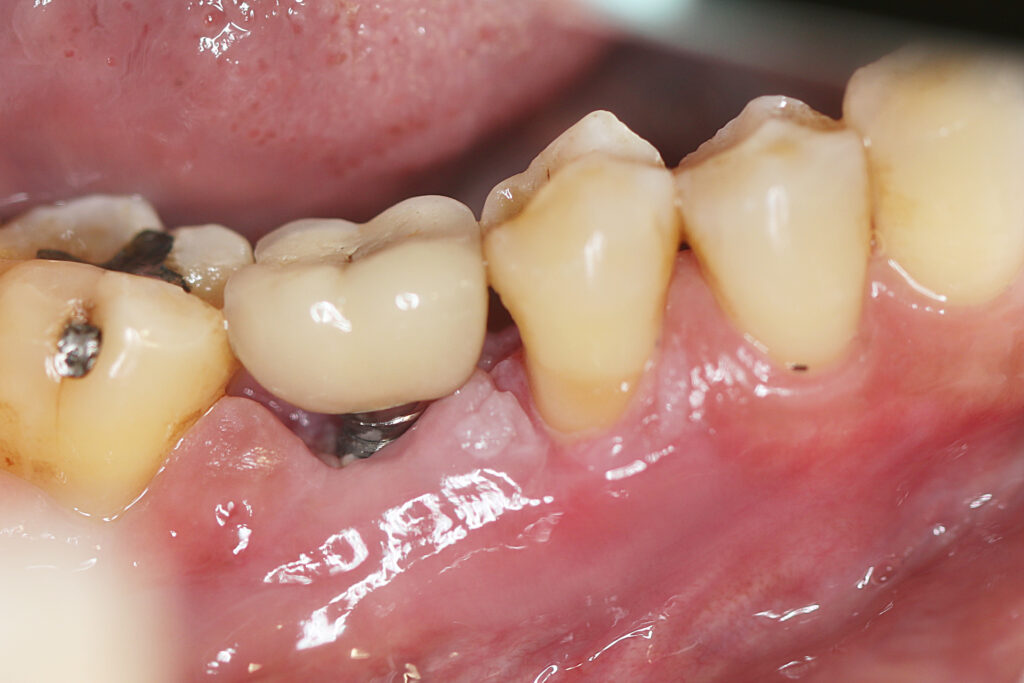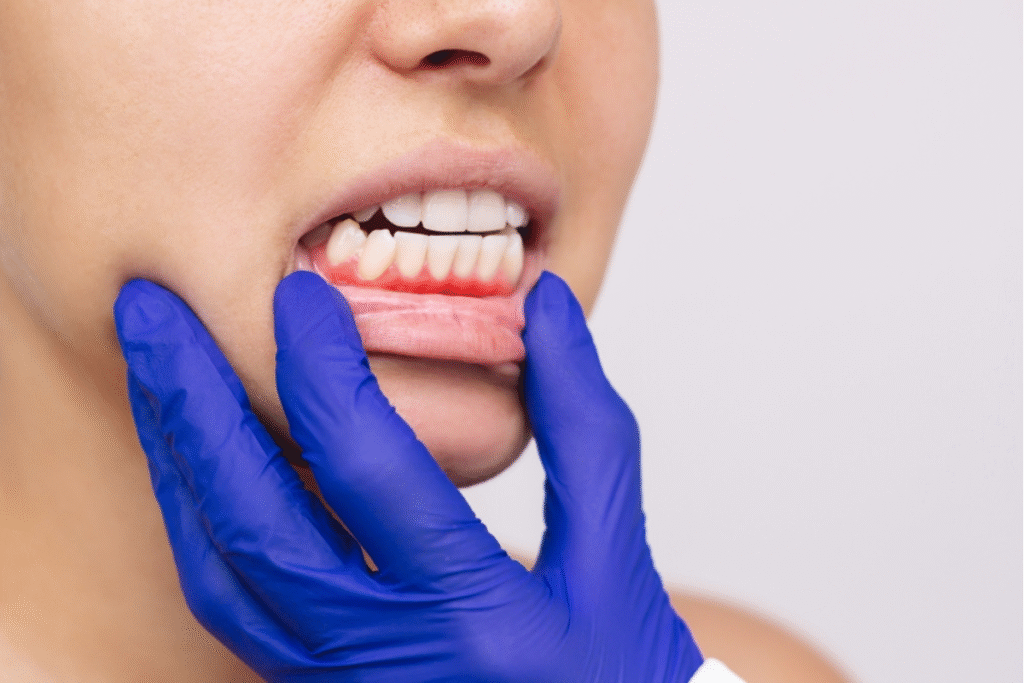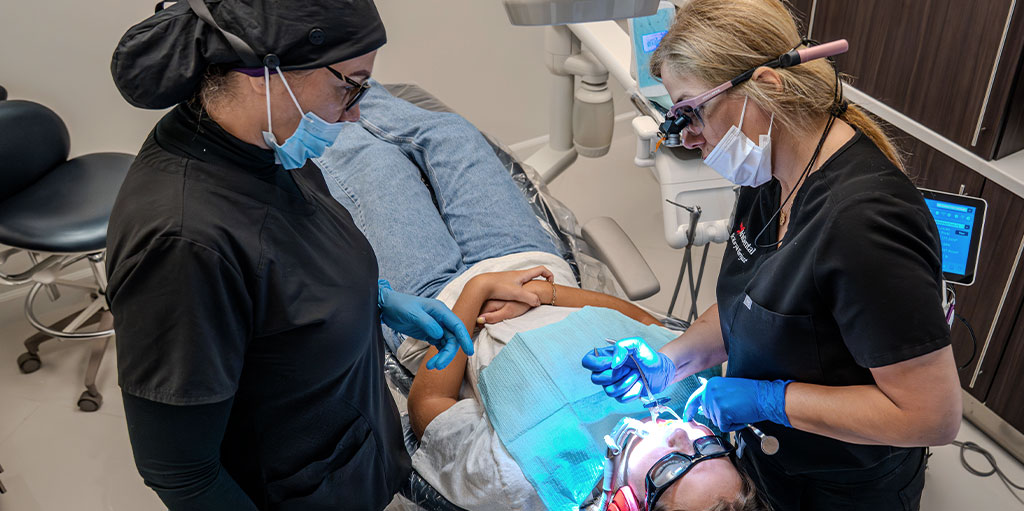If you are going to get your dental implants soon, it is better to be familiar with Dental Implant Infection. In this article, we will introduce you to 5 important signs of implant infection and some important tips for preventing implant problems and timely treatment. After reading this article, you can go for implants with more confidence and less worry.
In another article, we have explained what dental implants are and answered all of the questions regarding how they work
Having said that, let’s get started.
What Is a Dental Implant Infection?
A dental implant is a great opportunity for those who have lost one or more teeth to replace them. The implant procedure is usually safe and lasts for a long time. But can dental implants get infected? Unfortunately, the answer is yes. Dental implant infection is a potential risk for patients who opt for dental implants. Studies show that 4 to 10 percent of people who have metal (titanium) dental implants may develop an infection. Infection can affect the implant process and, in severe cases, even cause implant failure. For this reason, it is important for all patients to be aware of the symptoms of infection and to seek prompt treatment if a problem occurs.
According to this study from National Institute of of Health, this rate is less than %1 in zirconia implants.
Read more about zirconia dental implants here.
What Is Peri-mucositis?
Dental implant infections usually occur in the soft tissue surrounding the implant. If the inflammation is only in the gum tissue and there is no bone loss, it is called Peri-mucositis. This type of infection is reversible, and with proper treatment, the tooth can return to its normal condition. In this case, surgical treatment may not be necessary.
What Is Peri-Implantitis?
Another type of dental implant infection causes both inflammation in the soft tissue and progressive bone destruction around the implant. This type of infection, known as Peri-implantitis, is primarily caused by untreated mucositis and may, in advanced stages, lead to implant loss. This type of infection is more difficult to treat and may require bone reconstruction surgery or even implant removal.
Peri-implantitis or dental implant infection is a condition that is characterized by bone and gum infection at the site of the implant. It can vary from a slight soreness to gum and bone degradation. However, there is little to no pain, so it can develop silently and quickly.
Why Do Dental Implant Infections Happen?
Dental implant infections can happen in the gums and bone around the implant. The problem occurs when bacteria collect around the implant base. If the implant area is clean and the body’s resistance to slight infections is high, infections seldom occur or can be cured easily. The most important reasons that cause this problem are:
- Failure to follow hygienic regulations in the implantation of the implants by the dentist.
- Professional negligence in the implantation or the implantation of substandard implants, creating a space between the jawbone and the implant, acting as an oral bacteria breeding place
- Lack of attention to good oral hygiene through lack of brushing or flossing, and high sugar consumption
- Bitten or crooked teeth, as a result of which implants will be difficult to clean and more susceptible to bacterial accumulation and infection
- Smoking narrows down the blood vessels to the gums and causes dry mouth, both of which will lead to an increase in erosive oral bacteria
- Body’s allergic reaction to the introduction of titanium implants
- Systemic illnesses such as diabetes, osteoporosis, or autoimmune diseases
- Immunosuppression caused by the use of immunosuppressive medication or chemotherapy
- Grinding or constantly clenching the teeth
You can go see your physician at once if you know dental implant infection symptoms and receive treatment when symptoms are just starting.
What Are The Signs of Dental Implant Infection?

Identification of dental implant infection signs will assist you in realizing the problem early and having it addressed. Below are the 5 common dental implant infection signs that you should look out for.
1. Pain And Discomfort
It is normal to experience some discomfort and pain after your dental implant procedure. However, the pain does subside and will be gone within 7 to 10 days of treatment. But if you have pain 3-4 weeks after the procedure, this could be a sign that you have an infection.
Mild surgery pain is typically managed with pain medication and resolves slowly. This pain may last up to two weeks and may be accompanied by some swelling. Pain from infection, on the other hand, may start weeks or months after surgery and cannot be controlled with pain medication. This type of pain is aching and throbbing, unlike normal surgical pain, and may worsen over time. Or you might have pain when chewing or a new taste in your mouth. In this case, visit your dentist immediately.
2. Red And Swollen Gum Around The Implant
Like pain, swelling, and redness after implant surgery should resolve within a few days of surgery. Inflammation or persistent, worsening swelling is a common sign of a dental implant infection. The swelling and redness may be accompanied by fever or pus.
3. Bad Taste or Odor in Your Mouth
The primary cause of infection is the accumulation of bacteria. These bacteria accumulate on the gums and around the teeth and are not removed by brushing. This is why you may notice a strange taste or bad smell in your mouth that doesn’t go away.
4. Bleeding Gums

Bleeding, especially if accompanied by pus and swelling, is a telltale sign of a dental implant infection. It is normal to have some bleeding immediately after surgery for a few days. However, the bleeding should stop once the surgical wound has healed. Bleeding from an infection can occur with regular brushing or flossing, or it can even be spontaneous.
5. Loose Implant
Dental implants are screwed into the jawbone and should be as strong as a natural tooth. If the implant becomes loose, it indicates that something is wrong. It may not have healed properly, or your jawbone has eroded, causing the implant to become loose. Since dental implant infection can cause jawbone loss, loose implants may be a sign of infection. This is a very important sign, so see your doctor at the slightest change in the position of the implant.
How Is Dental Implant Infection Diagnosed?
Dental implant infection is usually diagnosed in your routine six-month checkups after your procedure. So, never miss an appointment. During these checkups, your dentist will examine your natural teeth and the implant sites for inflammation, infection, or instability. If there is a suspicion, your doctor takes an X-ray and probes around the implant to determine the level of inflammation and infection. After all these steps, you can have a treatment plan.
What Are The Treatment Options for Dental Implant Infection?
When the infection is beyond the help of medication, the treatment options include non-surgical cleaning, the surgical procedure of open flap debridement, or removing the implant, partly or entirely.
Non-Surgical Cleaning
If your dentist considers a non-surgical cleaning effective for you, there are mechanical and ultrasonic methods. In the mechanical method, the cleaning is performed with the help of hooks and brushes. But in the ultrasonic method, a device is used that emits high-frequency, vibrational waves to clean the area.
Open Flap Debridement
Sometimes, you might need a surgical procedure. Open flap debridement involves cutting a small flap of gum to facilitate cleaning of the infected area. Then, it is manually cleaned and stitched along with antiseptic injections, to reduce the chance of another infection.
Removing the Crown or the Implant
If the infection is more focused around the crown of your implant, replacing it might be enough to reduce infection significantly. However, if there is bone loss as a result of peri-implantitis, your doctor will have to remove the implant completely. For the replacement of a new implant, you might need a bone graft.
How to prevent dental implant infection?
To get dental implants, go to a reputable and professional dentist and inform them if you have a specific underlying disease or are taking medication. If you live in California, we recommend booking a consultation session with Dr. Maryam Horiyat to make sure everything will be being carried out as it should. At Aria Dental we provide you with the highest quality treatments with the help of the best specialists and the most up-to-date methods.
To better complete your treatment period and avoid dental implant infection, follow a few important tips. First, brush your teeth twice a day and floss. In addition, have a proper diet. Do not eat foods that are too high in sugar, and increase your intake of nutritious fruits and vegetables.
Drinking eight glasses of water a day is also a good way to prevent dental implant infection because it helps improve blood flow in the gums. But ultimately, smoking is one of the most harmful things for dental implants. It is better to quit smoking or minimize its consumption.
Where Can You Find A Holistic Dentist?
This article explained everything about dental implant infection and how to prevent it. If you want a safe and natural procedure, Aria Dental in Orange County, California, offers a holistic implant service that ensures your oral and overall health. You just need to contact us today to schedule a consultation. Our professional team will take care of the rest.















